Live Events
16 May
On Saturday night, Roland and I went to the concert room in St George's Hall to hear a recital by the distinguished pianist, Richard Goode.
Not necessarily an awful lot of news there you might think but, in the four months since I stopped writing regularly in this Journal, I have been to far fewer live events than I might normally have. I put this down as another symptom of feeling ill and feeling depressed but it was also to do with saving money in case my life changed and I became a student this autumn.
 I'd been looking forward for some time to hearing Richard Goode again. I attended a recital he gave at the Edinburgh Festival back in 1994 when I first met up with Rod and Dale. It was an all Beethoven programme and it was a truly revelatory experience. I was hoping for more of the same. However, the first half did not deliver the goods.
I'd been looking forward for some time to hearing Richard Goode again. I attended a recital he gave at the Edinburgh Festival back in 1994 when I first met up with Rod and Dale. It was an all Beethoven programme and it was a truly revelatory experience. I was hoping for more of the same. However, the first half did not deliver the goods.
Works by William Byrd would have been better suited to the spinnet rather than a Steinway grand. The same could be said of the Bach Partita No 6. No amount of patrician grace could disguise the fact that this was not music for the pianoforte. The following Chopin showed more excellent technique but here the failing was mine as I just don't get the majority of Chopin's output.
So, at the interval, my feeling was that this was a good recital by an excellent pianist who was playing all the wrong material. The one work after the interval was Schubert's last piano sonata in B flat. I hoped for better things here. It's a work I love and have lived with for a long time. Eighteen months ago, I heard Radu Lupu give a very mixed performance of this work - all affects with very little coherent thought behind the whole.
Well, I was not disappointed. At the very offset, Goode began the opening chorale-like theme as though he were setting off on a journey. And then he allowed the grumbling trill in the bass to thoroughly interrupt the journey. And then he paused. It's in the score but few pianists actually allow silence here. So, when he took up the journey again, it was extremely unsettling - as it should be.
In fact, he turned the first movement into a tone poem about Schubert's state of mind contemplating mortality through serious illness (he was to die within two months though he did not know that at the time), the joys and sorrows of life and the consolation of beauty.
Then came a slow movement of breath-taking beauty which had me close to tears. The scherzo and allegro finale followed all carefully thought through and played with consummate skill - right to the end with the jaunty theme constantly interrupted by a single note (the whole piece is about interruptions - possibly in consideration of a life's creative career about to be completely interrupted) before the fast and furious peroration.
I was completely captivated and delighted that Roland had had the opportunity to sample this pianist at his very best. If the first half was simply good
![[Three Stars - Good]](3star.jpg) then the second half was absolutely excellent
then the second half was absolutely excellent
![[Four Stars - Excellent]](4star.jpg) .
.
A fortnight previously, Roland and I had attended two out of the three organ recitals that make up Livepool's Spring Bank Holiday Organ Day. I'm very glad to have heard the organ of the Anglican Cathedral in full flight but I don't think that I would go out of my way to hear it again. It all sounded too big and woolly for my ears.
![[Two Stars - Average]](2star.jpg)
The organ of the Metropolitan Cathedral for me sounded much clearer and brighter (Roland says that it is much more French in sound and I'll take his word for that). At some point, I should like to hear some Bach played there. My guess is that it would sound just right.
![[Three Stars - Good]](3star.jpg)
Just before Easter, as I was getting better from feeling ill, I attended a concert of music by Thomas Tallis, William Byrd, John Taverner and others of their contemporaries given by the Renaissance Music Group and the Chester Viols in the Lady Chapel of the Anglican Cathedral. Whilst the music was lovely and the setting is fabulous, the evening as a whole was scuppered by some untidy and leaden conducting and some poor stage management with the choir constantly moving back and forth between seats and standing positions. A tepid two and a half stars for that one.
![[Two and a Half Stars - Reasonable]](2_5star.jpg)
Just before I fell ill, I went up to Southport in the evening to hear some of the children from school performing in South Sefton Music Service's Wider Opportunities Festival. Like all such events it was incredibly mixed both as to content and standard. But it was a fun event and the kids were absolutely delighted that I had taken the trouble to support them.
And the only other musical event which I attended was an open rehearsal of Scherzo from Hans Rott's Symphony in E. This was great fun and Vassily pulled the sound around quite a bit to make it sound like a pastiche of every Mahler symphony you've ever heard (the two composers were students together but Rott lived with depression and mental illness and died at the young age of 25 from tuberculosis).
![[Three Stars - Good]](3star.jpg)
This is in contrast to all the concerts I didn't attend - like the evening performance after the rehearsal which included Mahler's Symphony No 1 or the concert with Ravel's Piano Concerto or the concert with Schumann's Rhenish Symphony or the concert with Schumann's Spring Symphony or the concert with Mahler's Resurrection Symphony or the concert with Mahler's Kindertotenlieder or the concert with Stravinsky's Petrushka or the recital with Ian Bostridge singing Brahms and Mahler or the concert with Andreas Scholl singing Medieval songs.
There's a lot there that I quite simply and consciously missed out on.
At the theatre, I didn't go to see Pigmalion or Arden of Faversham at Theatre Clwyd, nor Oh, What A Lovely War or Medea at the Liverpool Playhouse, nor yet The Comedy of Errors at the Royal Exchange in Manchester.
 At the end of January, Ross and I did go to FACT to see a broadcast of the National Theatre's show based on Terry Pratchett's Nation and, whilst this was alright
At the end of January, Ross and I did go to FACT to see a broadcast of the National Theatre's show based on Terry Pratchett's Nation and, whilst this was alright ![[Two and a Half Stars - Reasonable]](2_5star.jpg) , the fact that it was a recorded performance meant that it lacked the frisson that came with the showing of Racine's Phèdre starring Helen Mirren last year. I'd also have to say that the book was better.
, the fact that it was a recorded performance meant that it lacked the frisson that came with the showing of Racine's Phèdre starring Helen Mirren last year. I'd also have to say that the book was better.
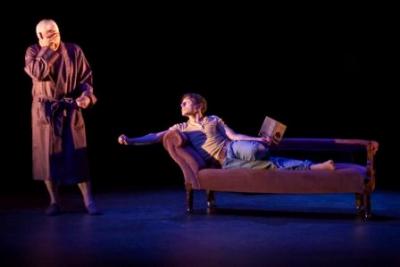 More recently, on Saturday 1 May, Ross and I took in Jonathan Harvey's new play, Canary, at the Liverpool Playhouse. This was both extremely good and a disappointment at the same time. It was extremely good because it did manage to cover a lot of pertinent gay history from the past fifty years. It was a disappointment because so much of it was very worthy and dull rather than being the celebration that Jonathan Harvey was surely capable of. I got the feeling that the whole show meant so much to him that he became increasingly buttoned up.
More recently, on Saturday 1 May, Ross and I took in Jonathan Harvey's new play, Canary, at the Liverpool Playhouse. This was both extremely good and a disappointment at the same time. It was extremely good because it did manage to cover a lot of pertinent gay history from the past fifty years. It was a disappointment because so much of it was very worthy and dull rather than being the celebration that Jonathan Harvey was surely capable of. I got the feeling that the whole show meant so much to him that he became increasingly buttoned up.
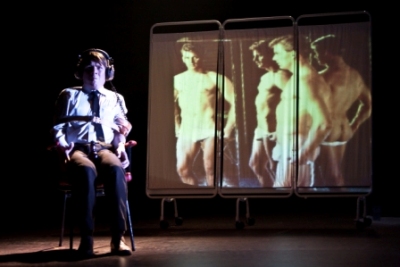 There were some very good and true scenes - like the evocation of gay protests at Festival of Light meetings, like the depiction of aversion therapy, like the nurse wearing full body protection as she approached the hospital bed of a young man with AIDS, like the middle aged former gay activist being angry with the older generation for being too much in the closet despite the legal system being against them and yet still managing to be angry with the younger generation for taking the relative liberties they enjoy for granted.
There were some very good and true scenes - like the evocation of gay protests at Festival of Light meetings, like the depiction of aversion therapy, like the nurse wearing full body protection as she approached the hospital bed of a young man with AIDS, like the middle aged former gay activist being angry with the older generation for being too much in the closet despite the legal system being against them and yet still managing to be angry with the younger generation for taking the relative liberties they enjoy for granted.
All of the cast played multiple roles. Philip Voss, for example, as well as playing the main character around who the major revelations of the play spin also put in cameo performances as Mary Whitehouse, a camp clarinettist from the orchestra of ENO and a right-wing judge. And this from a man I have seen with the RSC playing in both Coriolanus and Troilus and Cressida.
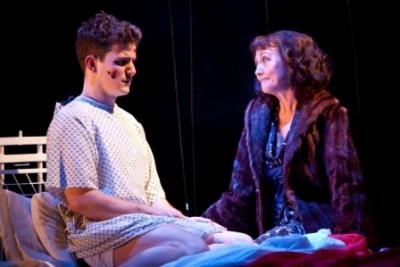 Paula Wilcox was game as a long-suffering wife and a mother in denial wrapped up in the same person. Ryan Simpson made his mark as a young man coming to terms with his sexuality (in fact it would have been very easy to think that the performance came right from the heart - if you catch my drift). Ben Allen coped well with his more stridently political friend. But it was essentially an ensemble piece directed with aplomb by Hettie Macdonald. I really wish that I could have warmed more to the enterprise as a whole.
Paula Wilcox was game as a long-suffering wife and a mother in denial wrapped up in the same person. Ryan Simpson made his mark as a young man coming to terms with his sexuality (in fact it would have been very easy to think that the performance came right from the heart - if you catch my drift). Ben Allen coped well with his more stridently political friend. But it was essentially an ensemble piece directed with aplomb by Hettie Macdonald. I really wish that I could have warmed more to the enterprise as a whole.
![[Three Stars - Good]](3star.jpg)
So, if I've been to a few music events whilst missing out on many others, if I've been to a couple of theatre shows whilst not attending several more, you would at least expect me to have gone to a shed load of opera performances. But no.
In the world of opera, I didn't go to Swansea City Opera's performance of Bizet's The Pearl Fishers, Welsh National Opera's performance of Mozart's Die Entführung aus dem Serail, Opera North's production of Puccini's La Bohème, English Touring Opera's production of Donizetti's Don Pasquale or Chelsea Opera Group's concert performance of Rossini's Guillaume Tell.
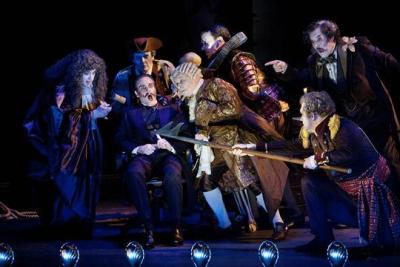 The one thing that Ross and I did go and see was Opera North's new production of Gilbert and Sullivan's Ruddigore at the end of February. I'd seen the piece once before, given by Crosby Gilbert and Sullivan Society on a cold January night in an uncomfortable local venue. I said then that "The piece itself contains no hit tunes and probably needs a good and inventive cast and production to make it into a good night out." Without hesitation, this presentation was an excellent night out.
The one thing that Ross and I did go and see was Opera North's new production of Gilbert and Sullivan's Ruddigore at the end of February. I'd seen the piece once before, given by Crosby Gilbert and Sullivan Society on a cold January night in an uncomfortable local venue. I said then that "The piece itself contains no hit tunes and probably needs a good and inventive cast and production to make it into a good night out." Without hesitation, this presentation was an excellent night out. ![[Four Stars - Excellent]](4star.jpg) John Wilson conducted a sprightly performance in the pit, Jo Davies's direction caught the spirit of the piece and the whole was enhanced by the designs of Richard Hudson.
John Wilson conducted a sprightly performance in the pit, Jo Davies's direction caught the spirit of the piece and the whole was enhanced by the designs of Richard Hudson.
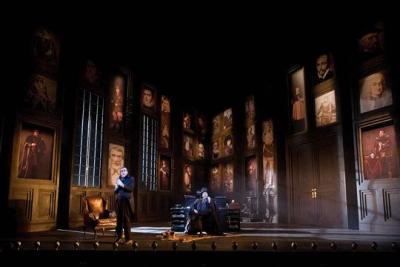 The cast was in fine fettle too. Both Richard Burkhard and Grant Doyle, as Sir Despard Murgatroyd and Robin Oakapple respectively, wooed and won the lasses of their choice. Hal Cazalet was a strongly cast and very winning Dick Dauntless. Amy Freston gave us a pert and crisply projected Rose Maybud, Heather Shipp, particularly, shone as Mad Margaret and Anne-Marie Owens was luxury casting as Dame Hannah. Richard Angas as Old Adam Goodheart and Steven Page as the ghostly Sir Roderic Murgatroyd took their chances in the small cameos they were given. I'd certainly go again if and when the show is revived in a couple of years' time.
The cast was in fine fettle too. Both Richard Burkhard and Grant Doyle, as Sir Despard Murgatroyd and Robin Oakapple respectively, wooed and won the lasses of their choice. Hal Cazalet was a strongly cast and very winning Dick Dauntless. Amy Freston gave us a pert and crisply projected Rose Maybud, Heather Shipp, particularly, shone as Mad Margaret and Anne-Marie Owens was luxury casting as Dame Hannah. Richard Angas as Old Adam Goodheart and Steven Page as the ghostly Sir Roderic Murgatroyd took their chances in the small cameos they were given. I'd certainly go again if and when the show is revived in a couple of years' time.
And that's about it. There were a couple of small social gatherings. Ross and I had Ed for Meal towards the end of March and he reciprocated at the end of April.
Other than that it has been a quiet time for the two of us both.
 I'd been looking forward for some time to hearing Richard Goode again. I attended a recital he gave at the Edinburgh Festival back in 1994 when I first met up with Rod and Dale. It was an all Beethoven programme and it was a truly revelatory experience. I was hoping for more of the same. However, the first half did not deliver the goods.
I'd been looking forward for some time to hearing Richard Goode again. I attended a recital he gave at the Edinburgh Festival back in 1994 when I first met up with Rod and Dale. It was an all Beethoven programme and it was a truly revelatory experience. I was hoping for more of the same. However, the first half did not deliver the goods.
 At the end of January, Ross and I did go to FACT to see a broadcast of the National Theatre's show based on Terry Pratchett's Nation and, whilst this was alright
At the end of January, Ross and I did go to FACT to see a broadcast of the National Theatre's show based on Terry Pratchett's Nation and, whilst this was alright  More recently, on Saturday 1 May, Ross and I took in Jonathan Harvey's new play, Canary, at the Liverpool Playhouse. This was both extremely good and a disappointment at the same time. It was extremely good because it did manage to cover a lot of pertinent gay history from the past fifty years. It was a disappointment because so much of it was very worthy and dull rather than being the celebration that Jonathan Harvey was surely capable of. I got the feeling that the whole show meant so much to him that he became increasingly buttoned up.
More recently, on Saturday 1 May, Ross and I took in Jonathan Harvey's new play, Canary, at the Liverpool Playhouse. This was both extremely good and a disappointment at the same time. It was extremely good because it did manage to cover a lot of pertinent gay history from the past fifty years. It was a disappointment because so much of it was very worthy and dull rather than being the celebration that Jonathan Harvey was surely capable of. I got the feeling that the whole show meant so much to him that he became increasingly buttoned up.
 There were some very good and true scenes - like the evocation of gay protests at Festival of Light meetings, like the depiction of aversion therapy, like the nurse wearing full body protection as she approached the hospital bed of a young man with AIDS, like the middle aged former gay activist being angry with the older generation for being too much in the closet despite the legal system being against them and yet still managing to be angry with the younger generation for taking the relative liberties they enjoy for granted.
There were some very good and true scenes - like the evocation of gay protests at Festival of Light meetings, like the depiction of aversion therapy, like the nurse wearing full body protection as she approached the hospital bed of a young man with AIDS, like the middle aged former gay activist being angry with the older generation for being too much in the closet despite the legal system being against them and yet still managing to be angry with the younger generation for taking the relative liberties they enjoy for granted.
 Paula Wilcox was game as a long-suffering wife and a mother in denial wrapped up in the same person. Ryan Simpson made his mark as a young man coming to terms with his sexuality (in fact it would have been very easy to think that the performance came right from the heart - if you catch my drift). Ben Allen coped well with his more stridently political friend. But it was essentially an ensemble piece directed with aplomb by Hettie Macdonald. I really wish that I could have warmed more to the enterprise as a whole.
Paula Wilcox was game as a long-suffering wife and a mother in denial wrapped up in the same person. Ryan Simpson made his mark as a young man coming to terms with his sexuality (in fact it would have been very easy to think that the performance came right from the heart - if you catch my drift). Ben Allen coped well with his more stridently political friend. But it was essentially an ensemble piece directed with aplomb by Hettie Macdonald. I really wish that I could have warmed more to the enterprise as a whole.
 The one thing that Ross and I did go and see was Opera North's new production of Gilbert and Sullivan's Ruddigore at the end of February. I'd seen the piece once before, given by
The one thing that Ross and I did go and see was Opera North's new production of Gilbert and Sullivan's Ruddigore at the end of February. I'd seen the piece once before, given by  The cast was in fine fettle too. Both Richard Burkhard and Grant Doyle, as Sir Despard Murgatroyd and Robin Oakapple respectively, wooed and won the lasses of their choice. Hal Cazalet was a strongly cast and very winning Dick Dauntless. Amy Freston gave us a pert and crisply projected Rose Maybud, Heather Shipp, particularly, shone as Mad Margaret and Anne-Marie Owens was luxury casting as Dame Hannah. Richard Angas as Old Adam Goodheart and Steven Page as the ghostly Sir Roderic Murgatroyd took their chances in the small cameos they were given. I'd certainly go again if and when the show is revived in a couple of years' time.
The cast was in fine fettle too. Both Richard Burkhard and Grant Doyle, as Sir Despard Murgatroyd and Robin Oakapple respectively, wooed and won the lasses of their choice. Hal Cazalet was a strongly cast and very winning Dick Dauntless. Amy Freston gave us a pert and crisply projected Rose Maybud, Heather Shipp, particularly, shone as Mad Margaret and Anne-Marie Owens was luxury casting as Dame Hannah. Richard Angas as Old Adam Goodheart and Steven Page as the ghostly Sir Roderic Murgatroyd took their chances in the small cameos they were given. I'd certainly go again if and when the show is revived in a couple of years' time.